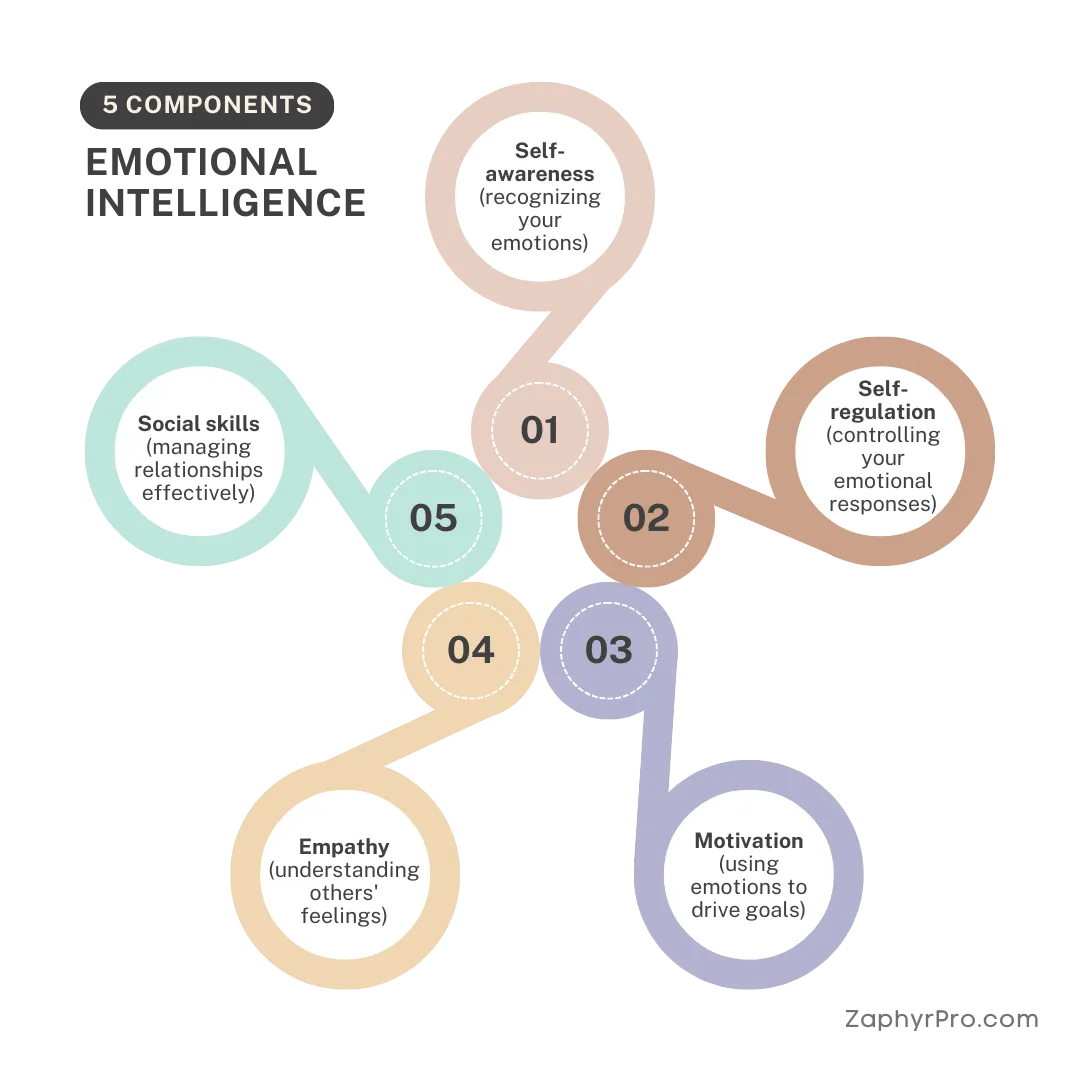Emotional Intelligence (EI) refers to the capacity to recognize, understand, and manage both your own emotions and those of others.
It involves five essential components:
- Self-awareness (recognizing your emotions),
- Self-regulation (controlling your emotional responses),
- Motivation (using emotions to drive goals),
- Empathy (understanding other’s feelings),
- Social skills (managing relationships effectively).
Mastering these elements enhances communication, improves relationships, and boosts overall leadership effectiveness.

In the dynamic landscape of modern business, emotional intelligence (EI) has emerged as a critical attribute for effective leadership. As Daniel Goleman, a pioneer in the field, said,
“What really matters for success, character, happiness, and lifelong achievements is a definite set of emotional skills—your EQ—not just purely cognitive abilities that are measured by conventional IQ tests.”
This perspective highlights the importance of emotional intelligence in leadership in cultivating a resilient and high-performing organization.
The Role of Emotional Intelligence in Building Strong Relationships
Emotional intelligence in leadership is about more than just understanding emotions; it’s about using that understanding to navigate social complexities and lead effectively. EI provides clarity and empathy, essential for building strong relationships and fostering a positive work environment. Leaders with high EI are adept at managing their own emotions and influencing the emotions of others, creating a culture of trust and collaboration.
Case Study: Emotional Intelligence in Action
Consider Satya Nadella’s leadership at Microsoft. His focus on empathy and emotional intelligence in leadership transformed Microsoft’s culture, driving innovation and collaboration. Similarly, in customer service, companies that prioritize emotional intelligence in their interactions often see higher customer satisfaction and loyalty. These real-world examples illustrate how emotional intelligence can drive organizational success.
Developing Emotional Intelligence: A Guide for Leaders
Developing emotional intelligence in leadership involves a deliberate process of self-awareness, self-regulation, motivation, empathy, and social skills.
- Self-awareness allows leaders to recognize their emotions and their impact on others.
- Self-regulation helps in managing emotions, reducing stress, and avoiding disruptive behavior.
- Motivation drives leaders to achieve goals with energy and persistence.
- Empathy enables understanding and sharing the feelings of others, fostering deeper connections.
- Social skills facilitate effective communication, conflict resolution, and leadership.
Practical Steps to Enhance Emotional Intelligence
Practical steps to enhance emotional intelligence in leadership include seeking feedback, practicing mindfulness, and engaging in active listening. Regularly reflecting on personal experiences and emotional responses can also aid in developing greater self-awareness. Leaders should strive to create an environment where emotional intelligence is valued and developed across all levels of the organization.
The Impact of Emotional Intelligence on Team Dynamics
The impact of emotional intelligence in leadership on team dynamics is profound. Teams led by emotionally intelligent leaders tend to have higher morale, better communication, and greater cohesion. These teams are more adaptable, resilient, and capable of navigating challenges effectively. By integrating EI into leadership strategies, organizations can enhance performance, innovation, and overall success.
Developing a Growth Mindset for Personal and Professional Success
Having a growth mindset can transform the way you approach challenges and opportunities in both your personal and professional life. It involves believing that your abilities and intelligence can be developed with effort, learning, and persistence. This mindset is crucial for achieving long-term success and fulfillment.
“The only way to achieve our goals is to go beyond what we think we can do.” – Carol Dweck
Adopting a growth mindset helps you embrace challenges, persist through obstacles, learn from criticism, and find inspiration in the success of others. These attributes are vital for personal development and professional advancement.
Applying Emotional Intelligence Across Various Leadership Roles
As you navigate your roles in Service, Operations, Sales, Marketing, or Leadership, remember that emotional intelligence in leadership is crucial for effective leadership. It enhances your ability to connect with others, manage stress, and make informed decisions. Set clear goals for developing your EI with achievable milestones. Foster a collaborative environment by encouraging open communication and empathy. Measure progress by tracking improvements in team dynamics and performance. Adapt and iterate your strategy based on feedback and evolving circumstances.
Conclusion: The Path Forward with Emotional Intelligence
Let your emotional intelligence in leadership illuminate your path as a leader. Reflect on your personal experiences: How can you develop your emotional intelligence in the coming months, and what steps will you take to integrate it into your leadership approach?
For further exploration, consider these books: “Emotional Intelligence 2.0” by Travis Bradberry, and “Primal Leadership” by Daniel Goleman. By integrating emotional intelligence in leadership into your strategy, you can achieve extraordinary results and foster a thriving organizational culture.










